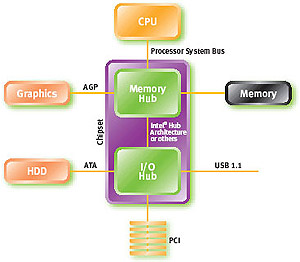An introduction to PCI Express: the AGP8X Replacement
Compared to the
progress made every year in other areas of computer technology such as
processors and video cards, computer I/O system technology would seem to be
standing still… in fact it is. Since the introduction of the original PCI bus back in the early 90’s,
very little has changed in the way that data is
handled inside your computer.
Hard
drives, peripherals, LAN cards, sound cards, USB, and
firewire all pass data through the same I/O system as your first 486 PC; the
PCI bus running at 33mhz and shifting 133MB/s of data. As an example of recent
technology, a Pentium 4 with DDR memory can shift 2.1GB/s across the memory
bus. The 8x AGP bus can pass about 2.1GB/s of data a second too. These are
technologies developed essentially to get around the limitations of the
PCI.
An ATA 133 hard drive on an Ultra/133 IDE
controller card can theoretically overload the PCI bus all by itself, though
only in brief bursts. The sustained transfer rate for current drives is too low
to do this however. Now let’s think about RAID, SCSI and now Gigabit Ethernet....
All of these data transfer technologies are trying to pump information through
that slim
little 133MB/s parallel PCI bus. This is the definition of a bottleneck.
 Now
all things considered, it is probably a good thing that the PCI bus has
remained essentially unchanged since its inception. For one thing, it works.
Now
all things considered, it is probably a good thing that the PCI bus has
remained essentially unchanged since its inception. For one thing, it works.
It has provided a stable and flexible platform for
hardware and software developers to build on for almost a decade. Anyone
who remembers the days before Windows 95 and 'Plug and Play' devices will
understand why computers have become so much more common since then.
Now there are three other PCI specifications in existence,
all designed to increase the amount of available bandwidth. These are 66MHz PCI,
PCI-X at 64bit/133MHz, and the soon to be introduced PCI-X 2.0.
The trouble is, while these technologies have, or
soon will find a permanent home in the server market, the complexities and extra
costs they introduce to motherboard manufacturing mean that they will be
virtually unknown at the desktop level. PCI-X, for
example, requires a controller for every slot and that is just too expensive.
The solution to this is being backed by everyone's favorite processor
manufacturer, Intel.

Intel, in partnership with several other companies which include
the likes of IBM, Dell, Compaq, HP and Microsoft, recently introduced what will be the new standard
for PC I/O in the years to come; PCI Express (formerly 3GIO
or 3rd Generation I/O) is the name which it was given by PCI-SIG,
the committee responsible for overseeing the PCI interface standard.
Approved as a standard on April 17 2002, PCI Express is an
evolutionary upgrade to the
existing PCI bus. It co-exists with the now 'legacy' PCI bus,
but in terms of form, it is something completely new.

